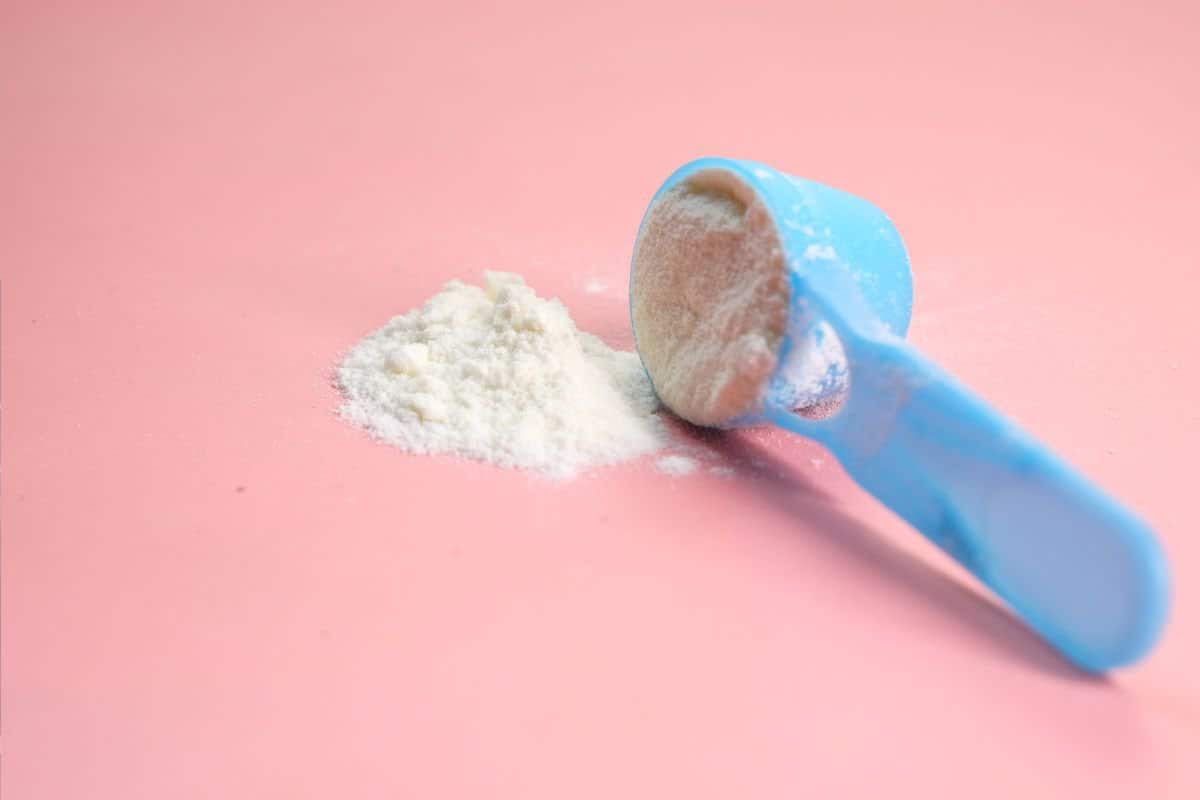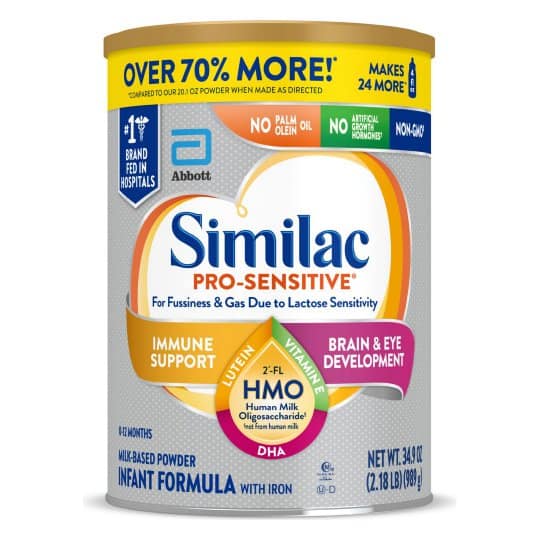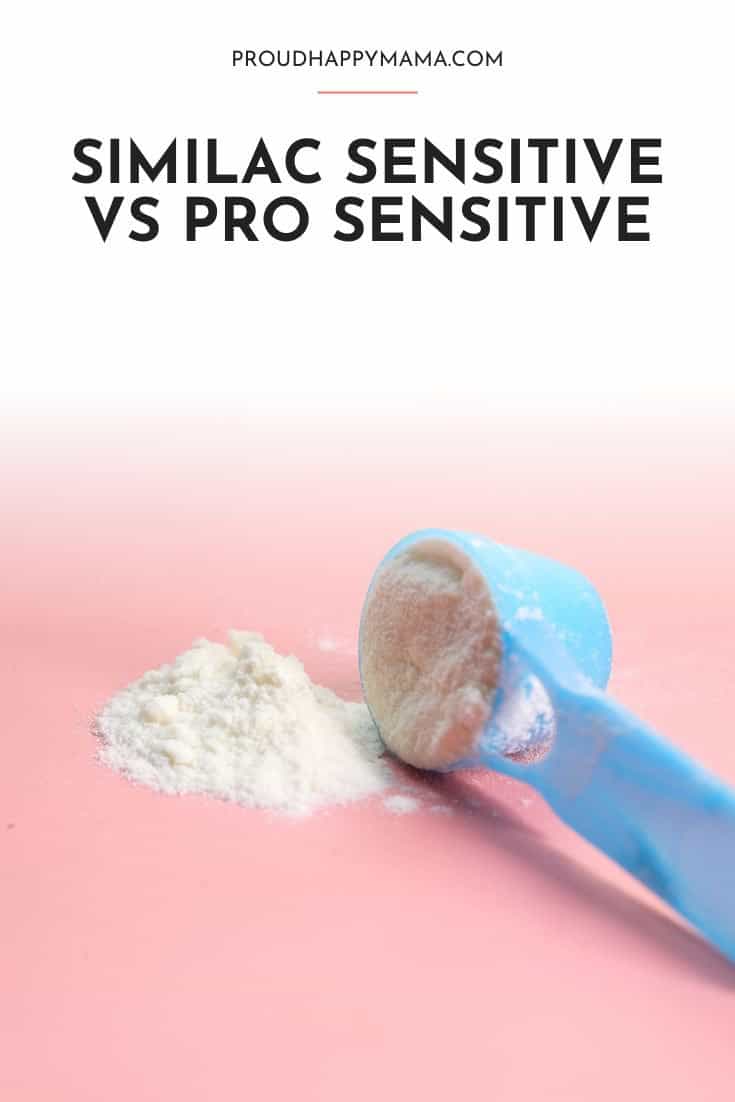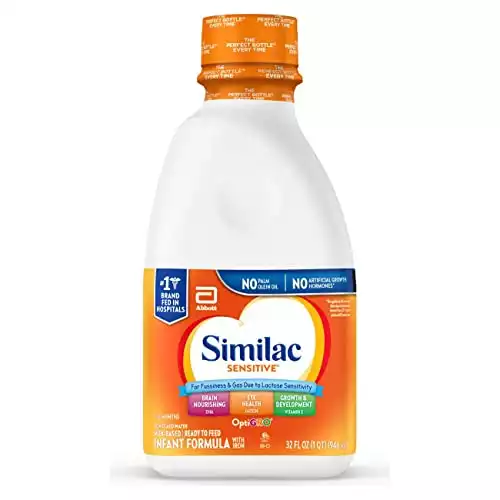Similac Sensitive Vs Pro Sensitive
Are you trying to decide between Similac Sensitive vs Pro Sensitive infant formula that supports sensitive stomachs and provides a complete feed?
Then let us help you decide which is best formula for you and your baby with our Similac Sensitive vs Similac Pro Sensitive review!
When tears and fussing starts after feeding, it can be difficult to identify the problem. Unfortunately, babies can’t tell us what’s wrong, all they can do is let us know there’s an issue!
For a surprisingly large amount of babies, the problem is lactose. This common sugar can be hard to digest, leading to upset stomachs, and upset infants.
Similac Sensitive and Similac Pro-Sensitive are milk-based infant formulas that are low in lactose and high in nutrients. Designed for sensitive stomachs, they might be the solution to feeding fussiness.
In this guide, we’ll explore the difference between Similac Pro Sensitive and Sensitive, including their features, pros, and cons.
And if you love this Similac Pro Sensitive vs Similac Sensitive review, make sure to check out our guides on Similac Pro Total Comfort Vs Pro Sensitive, Similac Sensitive Vs Total Comfort, Enfamil Gentlease vs Similac Sensitive, and Enfamil Sensitive Vs Gentlease! Or even our guide on Similac Pro Advance vs Pro Total Comfort!
This post contains affiliate links. See our full disclosure here

Similac Sensitive Vs Pro Sensitive
Let’s get started by exploring Similac Sensitive and Pro-Sensitive.
All About Similac Sensitive
Struggling with fussiness, gas, and spit-up after feeding? Your baby might be sensitive to lactose, a sugar that’s found in dairy products.
Unfortunately, dairy forms the basis of most baby formulas. So, what can you do?
Similac Sensitive is a low-lactose infant formula designed to suit sensitive tummies. Milk-based, most of the lactose is removed from the dairy, and replaced with a more digestible sugar.
Similac have also boosted their Sensitive formula with a blend of DHA, lutein, and vitamin E. These ingredients support the development of the brain and eyes, for a nutritionally complete formula.
Parents will also be happy to know that Similac Sensitive contains no palm olein oil, and no artificial growth hormones.
A top choice with doctors and hospitals, this is an excellent formula for satisfying sensitive stomachs.
Pros
- Easy-to-digest and suitable for sensitive stomachs thanks to minimal amounts of lactose.
- Boosted by a blend of DHA, lutein, and vitamin E, to support brain and eye development.
- Well priced for a low-lactose formula.
- No artificial growth hormones, and no palm olein oil.
- Contains a complex blend of vitamins, minerals, and other nutrients.
Cons
- The formula can foam when mixed, which might cause gas.
- Contains GMO ingredients.
- A strong taste that won’t appeal to all babies.
All About Similac Pro-Sensitive

There are many reasons to choose formula over breast milk, but you still want to ensure your child is getting the best nutrition possible.
That’s why brands such as Similac have taken such a close look at what makes breast milk so supportive, to replicate the nutritional blend for formulas.
Similac Pro-Sensitive closely resembles breast milk thanks to the addition of 2’-FL HMO. This prebiotic is found in human milk, and helps to develop a robust immune system in growing infants.
Similac Pro-Sensitive is a milk-based infant formula that contains low lactose levels. It’s easier for sensitive stomachs to digest, and can reduce fussiness, gas, and spit-up.
Formulated with a complex blend of vitamins and nutrients — including the special Similac blend of DHA, lutein, and vitamin E — this is a complete formula for supporting growing babies.
Easy to mix and with a sweet and delicate taste, Similac Pro-Sensitive is a popular choice with parents, hospitals, and babies!
Pros
- Contains 2’-FL HMO, a prebiotic that supports the immune system.
- A low-lactose formula designed for sensitive stomachs.
- Non-GMO, and contains no artificial growth hormones or palm olein oil.
- Boosted by a blend of DHA, lutein, and vitamin E, to support brain and eye development.
- A delicate and sweet taste that most babies appear to enjoy.
Cons
- Expensive.
Available from Silmilac.com.
Similarities And difference between Similac Pro Sensitive and Sensitive
As two milk-based low-lactose formulas created by Similac, you can expect some similarities between Similac Sensitive and Pro-Sensitive!
In this section, we’ll cover the similarities that make these formulas a strong choice for you and your family. We’ll also look at the important differences that will help you choose the best formula for your baby.
A Complete Formula To Support Development
It’s easy to worry that your child isn’t getting the nutrition they need, so let’s start with the basics: both Similac Sensitive and Pro-Sensitive are excellent choices for babies.
These are nutritionally complete formulas designed to support development.
Similac have created these formulas to closely mimic the nutritional value found in breast milk.
Sensitive and Pro-Sensitive contain the Similac exclusive blend of DHA, lutein, and vitamin E. These carefully selected ingredients encourage and support the development of healthy brains and eyes.
Similac is a trusted brand, popular with both parents and hospitals. Many parents have relied on Similac Sensitive and Pro-Sensitive to provide their little one with the best start in life possible.
Easy-To-Digest
Similac Sensitive and Similac Pro-Sensitive are milk-based formulas that contain a limited amount of lactose. Both options contain roughly 0.1 grams of lactose per 100 kcal.
Although Similac Sensitive and Pro-Sensitive contain low amounts of lactose, neither formula is lactose free! These formulas are also not suitable for infants with galactosemia.
The reduced amount of lactose found in both Similac Sensitive and Pro-Sensitive makes the formulas easier for sensitive stomachs to digest.
Lactose can be a tricky substance for the body to break down, and a lactose intolerance can lead to gas, spit-up, and general fussiness.
With only low amounts of lactose, the formulas are better for babies with lactose sensitivities, and delicate tummies.
The body can digest the formula better, helping babies to access all the nutrients they need, while taking (some of) the stress out of feeding time.
Ease Of Use
Both formulas are available in powder form, and easy to prepare by mixing with water.
Similac Sensitive does have a slight tendency to foam, which might be a problem for already gassy babies. It also makes the formula a little harder to use.
Some parents have found they can reduce the amount of foam by moderating how they mix the formula, but, of course, this takes more time.
If you choose ready-made Similac Sensitive, the foam won’t be a problem. Similac don’t currently sell Pro-Sensitive in a ready to feed formula (although this could potentially change).
2’-FL HMO Prebiotic
The main difference between Similac Sensitive and Similac Pro-Sensitive is the addition of this one ingredient: 2’-FL human milk oligosaccharide (HMO).
This prebiotic is found in the Similac Pro-Sensitive, but isn’t included in the Similac Sensitive.
So, what is 2’-FL HMO, and why does it make a difference?
2’-FL human milk oligosaccharide is a prebiotic that is naturally found in breast milk. It is nourishing and supportive, and helps the development of a strong and healthy immune system.
The addition of 2’-FL HMO makes Similac Pro-Sensitive closer than ever to breast milk.
This allows you to provide your infant with a supportive formula that is incredibly similar to breastfeeding.
GMO
Similac Pro-Sensitive is a non-GMO infant formula, and contains no ingredients that are genetically engineered. Similac Sensitive doesn’t claim to be non-GMO, so we should assume that there are genetically engineered ingredients included.
How important is this factor? All GMO ingredients sold in the US must pass strict regulations imposed by the FDA.
GMO ingredients are subject to the same standards as non-GMO ingredients. Formulas containing GMOs are still approved safe for sale.
However, some parents prefer to avoid GMOs. It’s very much a personal choice, although be aware that GMO-free products tend to be more expensive.
Both Similac Sensitive and Similac Pro-Sensitive are free from artificial growth hormones. Both formulas are also free from palm olein oil, which can limit calcium absorption.
Taste
It’s impossible to predict how a baby is going to react to a new taste!
They’re notoriously fussy, and there’s no guarantee your little one is going to enjoy the formula you’ve chosen. Unfortunately, that’s just how parenthood goes!
With that in mind, parents have noted that the Similac Sensitive has quite a strong taste. It’s not unpleasant, but it’s more likely to be divisive.
Similac Pro-Sensitive is sweeter and lighter, and has a wider appeal.
It’s worth mentioning taste, but it shouldn’t be the factor that makes your decision! As we mentioned, there’s really no way of knowing how your baby will react.
Price
One final difference between Similac Sensitive and Pro-Sensitive is the price.
As you might expect, the addition of 2’-FL HMO makes Pro-Sensitive the more expensive option. A few dollars per tub might not seem like much, but these expenses can add up.
Similac is a leading brand, and both formulas are at the pricier end of the market.
Final Thoughts On Similac Sensitive vs Similac Pro Sensitive
Similac Pro-Sensitive essentially takes the Sensitive formula, and gives it a boost!
The addition of 2’-FL HMO prebiotic ensures the Pro-Sensitive formula closely resembles breast milk, providing your baby with rich nutritional support. Parents have also found the Pro-Sensitive formula foams less, and tastes better.
However, it’s important to note that both these formulas are designed to support the healthy growth of your little one!
Parents should be reassured that both formulas are healthy choices for growing children. Similac Sensitive provides your little one with the nutrients they need, at a lower cost.
We hope this guide has helped you to discover the differences between Similac Sensitive and Pro-Sensitive! Finding the right formula can make feeding time happier, and easier!
And if you want to check out any more of our guides, we recommend checking out these guides on best formula that tastes like breast milk, how to keep baby bottle warm at night and how to warm bottles on the go. Or even our guides for the best bottles for tongue tie, and best baby bottles for reflux.


